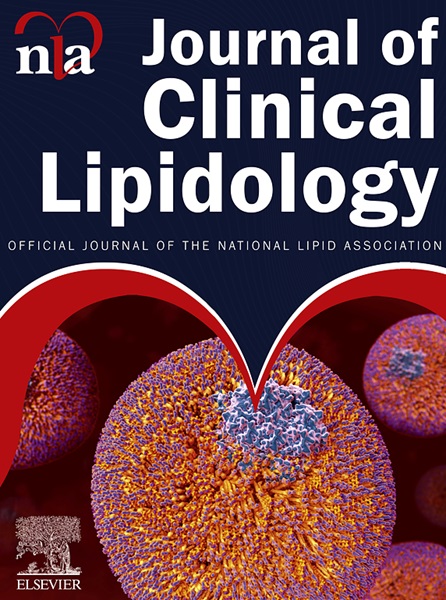One size doesn't fit all: A dose-dependent twist in PCSK9 monoclonal antibody therapy
IF 4.6
3区 医学
Q2 PHARMACOLOGY & PHARMACY
引用次数: 0
Abstract
Background/Synopsis
Proprotein convertase subtilisin/kexin type 9 (PCSK9) monoclonal antibodies are important therapeutic options for LDL cholesterol (LDL-C) lowering in patients with high cardiovascular risk. While PCSK9 monoclonal antibody non-responders have been well-characterized, a differential effect to once monthly versus biweekly dose formulations has not been described in the literature. We present the case of a 77-year-old woman with hypercholesterolemia and statin intolerance who demonstrated superior LDL-C lowering with once monthly PCSK9 monoclonal antibody therapy compared with biweekly formulations.
Objective/Purpose
To describe a case of superior LDL-C lowering with once monthly PCSK9 monoclonal antibody therapy compared with biweekly formulations.
Methods
Literature review and retrospective review of electronic health records.
Results
A 77-year-old female with coronary atherosclerosis (90th percentile coronary calcium score) and hypercholesterolemia presented to our lipid clinic for evaluation. The patient experienced myalgias and gastrointestinal side effects to multiple statins, ezetimibe, and bile acid sequestrants. The patient declined bempedoic acid due to concerns about potential side effects.
Her off-treatment lipid testing revealed total cholesterol 186, HDL 64, LDL 114, triglycerides 40, apolipoprotein B 79 and lipoprotein(a) 45 nmol/L. She was initiated on evolocumab 140 mg biweekly, resulting in a modest LDL-C reduction from 114 mg/dL to 106 mg/dL over six months. Given the suboptimal response, she was transitioned to alirocumab 150 mg biweekly. Her LDL-C remained suboptimal at 101 mg/dL after three months. Timing of lab draws and injection technique were confirmed to be accurate.
Genetic testing revealed no pathogenic mutations related to cholesterol metabolism. Following a two-month treatment hiatus, she was prescribed evolocumab 420 mg monthly. This resulted in a more robust LDL-C reduction to 88 mg/dL, sustained over the following year. No other medication or lifestyle changes occurred over this timeframe.
Conclusions
This case illustrates a differential effect to once monthly versus biweekly PCSK9 monoclonal antibody formulations. It is notable that even with the evolocumab 420 mg monthly formulation, LDL-C lowering was less than what would be expected based on clinical trial data. However the LDL-C lowering was nearly double the biweekly formulations. While mechanisms of PCSK9 monoclonal antibody resistance are well-established, the variable response based on dosage formulation is not reported. This case illustrates that some PCSK9 monoclonal antibody “non-responders” may have more robust LDL-C lowering with an alternative dosing formulation. Further research is warranted to better understand the mechanisms and clinical implications of such formulation-dependent responses.
一个大小不适合所有:PCSK9单克隆抗体治疗的剂量依赖性扭曲
背景/摘要:枯草杆菌蛋白转化酶/ keexin 9型(PCSK9)单克隆抗体是降低心血管高危患者LDL- c的重要治疗选择。虽然PCSK9单克隆抗体无反应已被很好地表征,但在文献中尚未描述每月一次和每两周一次剂量制剂的差异效应。我们报告了一名患有高胆固醇血症和他汀类药物不耐受的77岁女性,与每两周一次的配方相比,每月一次的PCSK9单克隆抗体治疗显示出更好的LDL-C降低。目的/目的报告1例每月1次的PCSK9单克隆抗体治疗比每两周一次的单克隆抗体治疗具有更好的LDL-C降低效果。方法文献复习和回顾性分析电子健康档案。结果一名77岁女性,冠状动脉粥样硬化(第90百分位冠状动脉钙化评分)伴高胆固醇血症到脂质门诊就诊。患者对多种他汀类药物、依折麦布和胆汁酸抑制剂有肌痛和胃肠道副作用。由于担心潜在的副作用,患者拒绝使用苯甲多酸。治疗结束后脂质检测显示总胆固醇186,HDL 64, LDL 114,甘油三酯40,载脂蛋白b79和脂蛋白(a) 45 nmol/L。她开始每两周使用evolocumab 140 mg, 6个月后LDL-C从114 mg/dL降至106 mg/dL。考虑到治疗效果不佳,她改用alirocumab 150 mg双周治疗。三个月后,她的LDL-C仍为101 mg/dL。实验室抽血时间和注射技术被证实是准确的。基因检测未发现与胆固醇代谢相关的致病性突变。在治疗中断两个月后,她每月服用evolocumab 420mg。这导致LDL-C更强劲地下降到88 mg/dL,并在接下来的一年中持续。在此期间没有发生其他药物或生活方式的改变。结论:该病例说明了每月一次的PCSK9单克隆抗体制剂与每两周一次的PCSK9单克隆抗体制剂的不同效果。值得注意的是,即使使用evolocumab每月420mg的配方,LDL-C的降低也低于基于临床试验数据的预期。然而,LDL-C的降低几乎是两周配方的两倍。虽然PCSK9单克隆抗体耐药机制已经确定,但基于剂量配方的可变反应尚未报道。该病例表明,一些PCSK9单克隆抗体“无反应”可能具有更强的LDL-C降低与替代剂量制剂。为了更好地了解这种配方依赖性反应的机制和临床意义,有必要进行进一步的研究。
本文章由计算机程序翻译,如有差异,请以英文原文为准。
求助全文
约1分钟内获得全文
求助全文
来源期刊
CiteScore
7.00
自引率
6.80%
发文量
209
审稿时长
49 days
期刊介绍:
Because the scope of clinical lipidology is broad, the topics addressed by the Journal are equally diverse. Typical articles explore lipidology as it is practiced in the treatment setting, recent developments in pharmacological research, reports of treatment and trials, case studies, the impact of lifestyle modification, and similar academic material of interest to the practitioner.
Sections of Journal of clinical lipidology will address pioneering studies and the clinicians who conduct them, case studies, ethical standards and conduct, professional guidance such as ATP and NCEP, editorial commentary, letters from readers, National Lipid Association (NLA) news and upcoming event information, as well as abstracts from the NLA annual scientific sessions and the scientific forums held by its chapters, when appropriate.

 求助内容:
求助内容: 应助结果提醒方式:
应助结果提醒方式:


